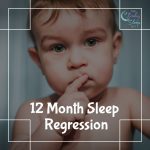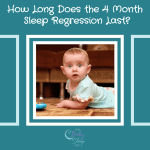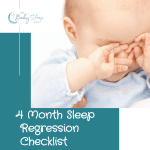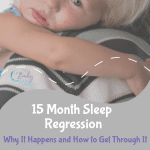 We have all heard of the 4 month sleep regression, but is there a 6-month sleep regression?
We have all heard of the 4 month sleep regression, but is there a 6-month sleep regression?
In my experience of over 15 years as a sleep consultant, there isn’t really a 6-month sleep regression so much as some other growth and development going on that may or may not impact your baby’s sleep. In this article, I will explore what’s happening so you can maximize your baby’s sleep.
6 Month Old Sleep Needs
Your 6-month old baby likely needs 11-12 hours of sleep at night and 2-3 hours of sleep during the day. Some babies will sleep more during the day and less at night. And, generally speaking, some babies may need more or less than the average. That’s why sleep schedules vary at this age!
Some 6-month olds still need feedings at night, so the nighttime sleep is not always uninterrupted. If you are feeding your baby formula, most likely your baby can be night-weaned completely unless your baby has reflux or another medical condition. If you are breastfeeding, your baby is more likely to need at least one feeding at night for a bit longer. All babies are different, of course, and be sure to talk to your baby’s pediatrician about the right time to night-wean.
If your baby was taking great naps and now has suddenly started taking short naps, you likely need to consider a schedule change. This is not really a sleep regression. During a true sleep regression, sleep will be poor for 3 to 6 weeks, on average. I have worked with thousands of families over the past 15+ years and there simply isn’t a standard time period where sleep is bad. If your 6 month old isn’t sleeping well, it’s something you can address immediately.
Babies go through several nap transitions and schedule changes during the first year to 18 months. If your baby has never taken great naps, you likely need to address the short nap problem another way. If your baby is waking a lot at night, you likely need to address sleeping through the night.
Need help with a schedule? Check out our sample 6-month-old schedule here.
A 6 Month Old’s Growth and Development
One very important thing to keep in mind about your 6-month-old is the rapid period of growth and development. Your baby is learning a lot of new things. Some babies will be rolling, some will start to scoot or crawl while still others may be learning to sit independently (with support). The huge thing about becoming more mobile is that it burns calories.
When a family comes to me about a baby who was sleeping all night without feedings suddenly needing a feeding, it’s usually due to a sharp increase in caloric needs. Imagine running (or even walking) on a treadmill all day. You are going to burn a LOT more calories and likely be hungrier throughout the day. If your metabolism stays high, you will need to increase how much you’re eating every day. Similarly, your baby will need to eat more, too. This likely means bigger milk feedings and this is a common age for babies to start solids.
Generally speaking, if your baby is sleeping well besides a new or returned night feeding, this is not a sleep regression but more about needing to eat more. This is an easy sleep problem to fix, usually, or you can simply add another nighttime feeding, temporarily, until your milk supply adjusts, your baby’s tummy gets bigger so she can eat a bigger bottle, or she’s eating a more significant amount of solid food. This will improve with time no matter what if this is the issue.
Thinking about sleep training? Check out our 5 Things to Know About Sleep Training Your 6 Month Old.
Conclusion
In the end, there is NOT a 6-month sleep regression, in my experience, and the next sleep regression you have to worry about is the 8 month sleep regression. I have worked with thousands of families and can tell you that there are common reasons babies wake at night, take short naps, and get fussy (like from teething), but there is not a typical 3-6-week period sleep regression at this age compared to actual sleep regressions. This simply doesn’t fit the description. That said, there are some babies who occasionally start the 8-month sleep regression early, but it’s generally more around 7 1/2 months old, not 6 months.








